Alps air crash killed three Britons, says Hammond
- Published
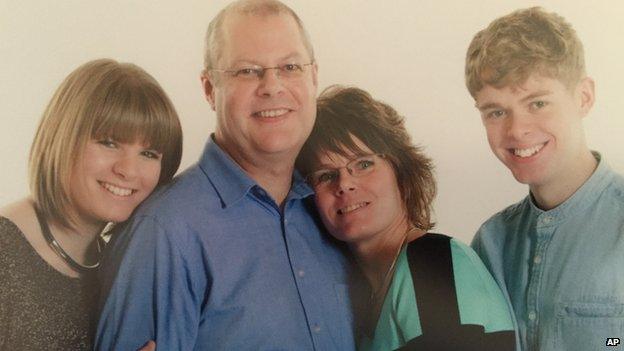
Martyn Matthews, pictured here with his wife Sharon and children Jade and Nathan, died in the crash
At least three Britons died in the Alps air crash that killed 150 people, UK Foreign Secretary Philip Hammond says.
The Germanwings Airbus A320 crashed in France on Tuesday, leaving no survivors.
The Foreign Office said Paul Bramley, 28, from Hull, and Martyn Matthews, 50, from Wolverhampton, died in the crash.
It said seven-month-old Julian Pracz-Bandres and his Spanish-born mother Marina Bandres Lopez-Belio, from Manchester, also lost their lives.
Mr Hammond said: "We cannot rule out the possibility" that other British people were involved in the crash.
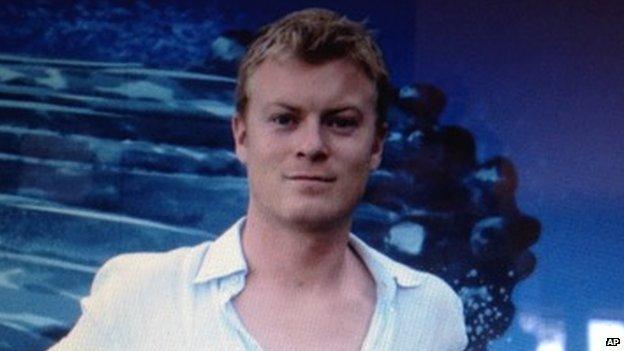
Paul Bramley's mother Carol said: 'He was the best son, he was my world'
Families of those from the UK known to have been killed have been contacted, the foreign secretary said.
In a statement released by the Foreign Office, Mr Bramley's mother Carol, who lives in Majorca, said: "Paul was a kind, caring and loving son. He was the best son, he was my world."
His father Philip Bramley, also from Hull, said they were both deeply shocked.
Mr Bramley had just finished his first year at the César Ritz College in Lucerne, Switzerland, where he was studying hospitality and hotel management.
Due to start an internship on 1 April, he had been flying back from a few days' holiday with friends in Barcelona and was due to stop in Duesseldorf on his way to meet his family in the UK.
Mr Matthews, a senior quality manager thought to be travelling to Germany for a meeting, was married with a son, and daughter.
His family said in a statement: "We are devastated at the news of this tragic incident and request that we are allowed to deal with this terrible news without intrusion at this difficult time."
Margaret Goodyear, a neighbour and former colleague of Mr Matthews, said he was a "lovely, lovely man".
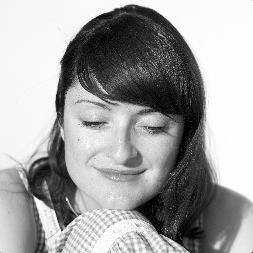
Marina Bandres had gone to Spain to attend a relative's funeral
Yesterday Pawel Pracz, whose wife Marina Bandres Lopez-Belio, 37, and son Julian died in the crash, said he was "devastated" at the loss.
He explained that his wife had bought last minute tickets to visit her family in Spain for her uncle's funeral.
Originally from Jaca in the Spanish Pyrenees, Ms Bandres met her Polish husband at the Futureworks School of Media in Manchester and went on to become an editor and colourist in post-production for film and video.
The couple had graduated together in 2009 and had lived together in the city for seven years.
Mr Pracz said: "I'm with my closest family in Manchester, and in close contact with our family in Spain at this very difficult time. "
Richard Hellawell, Ms Bandres' former tutor at Futureworks School of Media, Manchester, described her as a "model student" who was "exceptionally talented and hard-working."
He said: "One of the nice bright lights of the world has gone out."
Richard Goodaire, friend of victim from Manchester: "Marina was a very talented"
'Heartbreaking'
Prime Minister David Cameron and Labour leader Ed Miliband have offered their condolences to the families of those affected by the air crash.
Germanwings and Lufthansa staff stood in silence in Cologne on Wednesday morning to honour the dead.
Mr Cameron described the crash as "heartbreaking".
He told the Commons: "I know the whole House will wish to join me in offering our deepest condolences to the family and friends of all those killed in the yesterday's airbus crash in France.
"It is heartbreaking to hear about the schoolchildren, the babies, the families whose lives have been brought to an end."
Aerial footage showed the site of the crash in the Alps - courtesy BFM TV
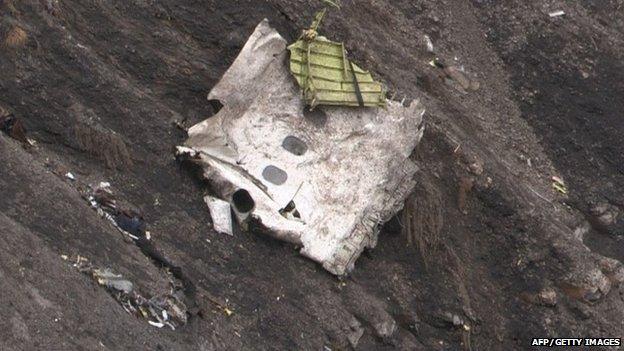
No-one aboard the Airbus A320 survived the crash
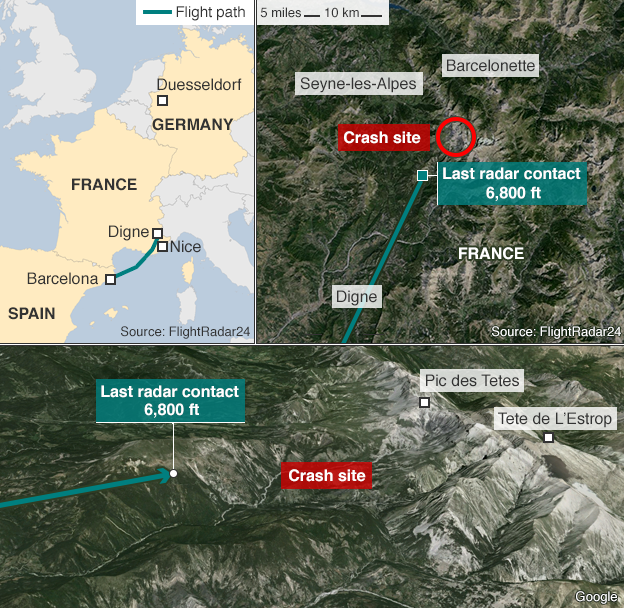
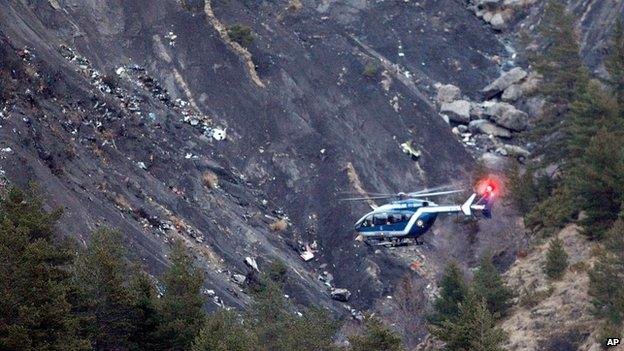
Helicopters ferried recovery teams to a crash site marked by smouldering debris
Germanwings chief Thomas Winkelmann said 72 of the 144 passengers were German citizens and 35 were Spanish, the remainder included citizens of the UK, Australia and Belgium, among others.
The German victims included 16 pupils returning from an exchange trip.
French President Francois Hollande, German Chancellor Angela Merkel and Spanish Prime Minister Mariano Rajoy visited the crash scene on Wednesday.
Mr Rajoy declared three days of national mourning in Spain.
Bereaved relatives are expected to visit the scene. The mayor of Seyne-les-Alpes, the town nearest the crash site, said local families were offering to host them.
At a press conference on Wednesday, Mr Winkelmann said the airline would provide financial support and transport for any relatives wanting to visit the scene from overseas.
A day of mourning is being held at the Joseph-Koenig-Gymnasium school in Haltern-am-See, north-west Germany, where the pupils were from.

Analysis: Richard Westcott, BBC Transport Correspondent
The cockpit voice recorder "black box" is pretty battered but the devices are bomb-proof, literally, so investigators should still be able to listen to what happened on board.
Richard Westcott reports on the cockpit voice recorder data
The large, orange cylindrical part in the middle holds the memory boards that record the pilots' voices, and that looks intact to me.
The critical question now is, were the pilots speaking during those lost eight minutes when the aircraft dropped from 38,000ft to the ground?
If they're quiet, investigators will know they were unconscious, and that suggests a major decompression took place on board.
That's when a hole in the fuselage lets all the air out. It's not necessarily fatal, if the pilots can get their oxygen masks on in time, something they train for, but if they were knocked out, it would explain the lack of a mayday call or any obvious attempt to steer the stricken aircraft to the nearest runway.

The plane's "black box" cockpit voice recorder is believed to be damaged but has been sent to Paris where officials still hope to retrieve data from it.
Remi Jouty, from the French investigating organisation BEA, said initial examinations had found usable sounds and voices, but that it was too soon to draw any conclusions.
He said they hoped to have the first "rough ideas" within a few days, but a fuller understanding could take weeks or even months.
Investigators are still searching for the second "black box" - the flight data recorder.
Investigators said the plane hit the ground in the French Alps at great velocity, suggesting no explosion in flight.